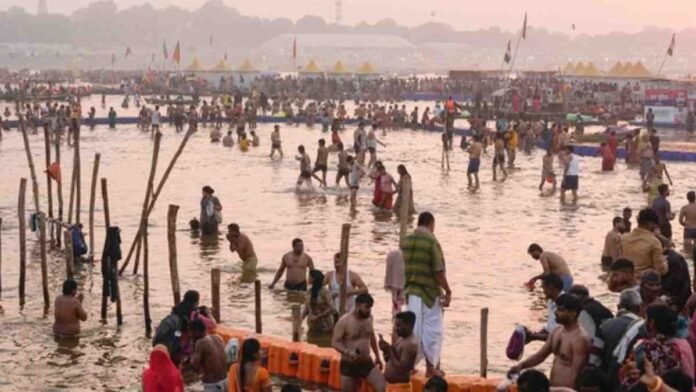With its great religious significance, the Ganga River draws millions of devotees who bathe in its sacred waters, particularly during the ongoing Maha Kumbh Mela. The Central Pollution Control Board (CPCB) has recently released studies that raise serious concerns regarding the prevalence of faecal coliform bacteria in the Prayagraj River. Sewage discharge is the main source of this bacterial pollution, which is extremely dangerous to human health. Here’s all you need to know about the risks faecal coliform poses to human health and how it impacts water quality.
What is faecal coliform, and why is it harmful?
Both human and animal intestines contain a type of bacterium known as faecal coliform bacteria. Their presence indicates that sewage or animal waste has contaminated the water. Coliform bacteria raises the risk that the water contains other dangerous pathogens such as viruses, Salmonella, and E. coli, even if not all of them are poisonous. Serious diseases may result from exposure to these bacteria.
How serious is the intoxication in the Ganga in Prayagraj?
There can be no more than 2,500 units of faecal coliform per 100 millilitres of bathing water, according to the CPCB. Test data from various Prayagraj locations during the Maha Kumbh Mela revealed levels over the limit, indicating significant pollution. When millions go swimming, the risk of spreading waterborne infections increases significantly. Untreated sewage from nearby areas exacerbates the situation and renders the water unsafe for direct human contact.
Exposure to faecal germs may provide health hazards
Taking a bath in faecal coliform-contaminated water can lead to several health problems, such as:
- Gastrointestinal infections: Pathogens such as Salmonella and E. coli may be the source of symptoms such as cramping in the stomach, vomiting, and diarrhoea.
- Fungal infections, rashes, and eye discomfort can result from contact with contaminated water.
- Ingestion of tainted water can transmit the dangerous illnesses typhoid and hepatitis A, which can cause long-term health issues.
- Respiratory problems: Lung infections can result from breathing in bacterial water droplets, particularly those with weakened immune systems.
What impact does this have on local communities and pilgrims?
When devotees take a ritual dip, they run the immediate risk of breathing in or ingesting contaminated water. Manynorant of many possible health risks. Neighbours who depend on the river for cooking and drinking are likewise concerned about long-term exposure to dangerous microorganisms. Children, older people, and those with weakened immune systems are particularly at risk.
Measures that authorities are taking
- Authorities advise akharas to leave ghats as soon as possible for cleaning and to adhere to specified schedules.
- Please refrain from tossing clothing and shoes into the river, devotees.
- Organizers are giving everyone steel utensils and canvas bags to cut down on plastic waste.



